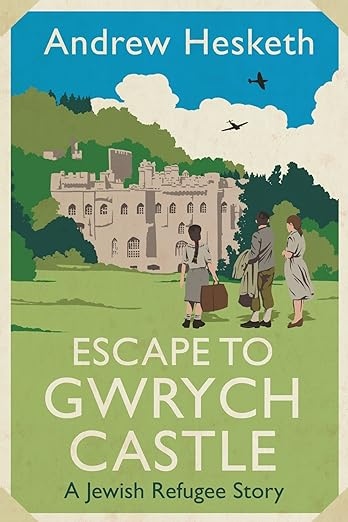Escape to Gwrych Castle, by Andrew Hesketh
The author explores the lesser-told history of the children who lived in this North Wales castle once used for I’m a Celebrity, Get Me Out of Here - a worthwhile read with some Baptist involvement in the story, too
 Escape to Gwrych Castle - A Jewish Refugee Story
Escape to Gwrych Castle - A Jewish Refugee Story
By Andrew Hesketh
Calon (University of Wales Press)
ISBN: 978-1-837600-06-9
Reviewed by the Revd Dr Martin M’Caw
Many of you may remember Gwrych Castle from watching I’m a Celebrity, Get Me Out of Here during the Covid 19 pandemic. The phrase I’m a Jewish refugee keep me safe in here is more appropriate to describe the 200 Jewish teenagers and about 50 adult helpers who lived in the castle between 1939-1940, the period of focus for this book. All the racial, religious and technical points are seamlessly strung together in a manner that keeps the reader's attention, including 48 pages of appendices and notes.
Gwrych Castle can be glimpsed from the A55 trunk between St. Asaph and Abergele. Built in the 16th century it was bought and remodelled in the later 19th century. In 1935 Lord Dundonald mothballed the castle with three main rooms locked for storage and unsold furniture.
During the Second World War, as part of the of the Kindertransport programme, the Government used the castle to house around 200 young Jewish refugees but not their parents. It was run by the Jewish Zionist youth movement Bnei Akiva.
The book is not a detailed analysis of Jewish theology, but an account of the development and progress of the hachshara, an agricultural training course in preparation for a return to Israel. Life at Gwrych could be compared to life at a large boarding school with friendships, aggravations and progress attributed to the leaders.
Many difficulties were overcome against the odds: a leaking roof, draughts from windows and a lack of furniture. The dining room was not big enough so the music room and hall had to be used. There were 100 slates rather than plates, with only half the number of cutlery and cups. Meals were served to a staggered timetable with three sittings later reduced to two.
Dr. Julius Handler, a Moravian refugee and a Gwrych leader, contacted local ministers to explain the castle was being used as a hachshara (an agricultural training centre).
He was met with enthusiasm. The local nonconformist ministry was genuinely helpful and interested, especially the Abergele Welsh Baptist chapel which closed around 2007. Overall the Rabbi had good relationships with local ministers. The Baptists were particularly enthusiastic.
In early 1940 the community held a Kongress ‘to solve the Jewish question.’ Debating centred on three key issues: a Jewish homeland in Israel, continuing as enclave communities, and full assimilation into home communities. At the end of the Kongress the vote was unanimous : ‘A Jewish nation in the Jewish land ’with a socialist economy and Torah culture.'
The German invasion of France and evacuation of Dunkirk brought a hardening of anti-German attitudes. Between 17 to 20 older boys were sent to the Isle of Man or dispatched in cramped unhygienic conditions to Canada and Australia.
The war was coming closer. British planes chasing German bombers with the released bombs caused destruction and death in the locality. Perhaps the final highlight was the observing of Yom Kippur in October.
Several reasons were suggested for the closing of Gwyrch, but the overall one was financial and possibly that despite good relationships between Gwrych and the people of Abergele, Jewish people were not massing in Abergele. The Epilogue outlines the later significant achievements of some of the youngsters.
Escape to Gwrych Castle is an interesting account of establishing the training centre, the relationships that developed with local people and farmers placed at the heart of hachshara intentions within the wider work of wartime Zionism.
A very worthwhile read.
The Revd Dr Martin M’Caw (retired Baptist minister and Wing Chaplain No2 Welsh Wing RAF Cadets, also retired)
Baptist Times, 15/09/2023